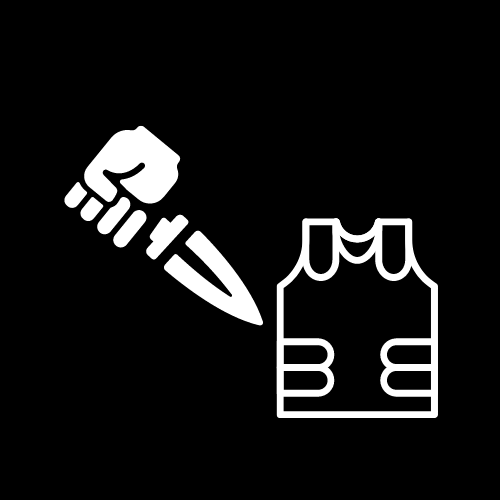Understanding Stab Protection Standards
When it comes to personal safety, especially in high-risk professions, understanding the certifications and standards for stab protection is crucial. Here, we'll delve into some of the key certifications for stab-resistant body armour: CAST KR1, NIJ Standard 0115.00 Threat Level 1, and VPAM Needle Protection. We’ll also explore other common standards that ensure the highest levels of protection.
CAST KR1 Certification
The CAST (Centre for Applied Science and Technology) KR1 certification is a prominent UK standard established by the Home Office. This certification assesses the resistance of body armour to knife attacks. Here’s a closer look:
- Protection Level: CAST KR1 tests the armour's resistance to single-edged weapons such as kitchen knives and machetes.
- Testing Method: The armour is subjected to impacts from a test blade at specific energy levels (24 and 36 joules) to ensure it can withstand realistic attack scenarios.
This certification is essential for law enforcement and security personnel in the UK and is used as a baseline for stab protection internationally, providing assurance that their body armour can offer significant protection against common knife threats.
NIJ Standard 0115.00 Threat Level 1
The National Institute of Justice (NIJ) in the United States sets the Standard 0115.00 Threat Level 1 for stab and spike resistance. This standard is widely recognized and respected globally. Here’s what it entails:
- Protection Level: This standard covers low to medium-energy threats, typically encountered in correctional environments. It includes protection against both knives and spikes.
- Testing Method: Armour is tested against different threat levels, including a standard kitchen knife and an ice pick, to ensure comprehensive protection.
This certification is vital for correctional officers and other professionals who might face sharp object attacks.
VPAM Needle Protection
The VPAM (Vereinigung der Prüfstellen für angriffshemmende Materialien und Konstruktionen) KDIW 2004 certification is a German standard for testing needle protection in body armour. Here are the key details:
- Protection Level: This standard focuses on protecting against puncture threats from sharp, pointed objects, such as needles.
- Testing Method: The testing involves applying force with a needle-like object to ensure the material can prevent penetration.
This certification is particularly relevant for prison officers and healthcare workers who may face threats from improvised sharp objects.
Other Common Standards
In addition to CAST, NIJ, and VPAM, there are other significant standards and certifications for body armour:
- HOSDB (Home Office Scientific Development Branch): This UK standard is similar to CAST and focuses on various forms of protective gear, including stab-resistant armour.
- ISO 14876-1: This international standard specifies the requirements for the performance and testing of body armour intended to protect against stab and spike threats.
- EN 388: Although primarily for cut-resistant gloves, this European standard also provides guidelines that can be relevant to body armour in terms of cut resistance.
Conclusion
Understanding the various standards for stab-resistant body armour is crucial for making informed decisions about personal protection. Certifications like CAST KR1, NIJ Standard 0115.00 Threat Level 1, and VPAM KDIW 2004 ensure that the protective gear you choose has been rigorously tested and meets stringent safety criteria. By familiarizing yourself with these standards, you can better appreciate the level of protection offered and select the right equipment for your needs.
For more detailed information on these certifications, you can visit their official sources linked above. Stay safe and informed by choosing certified, high-quality protective gear.

